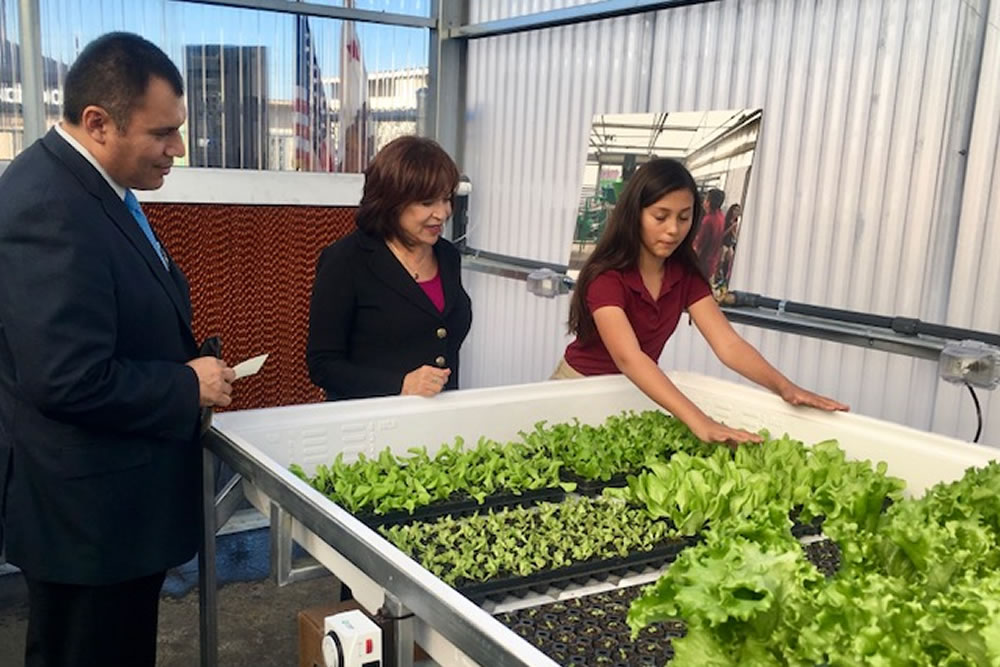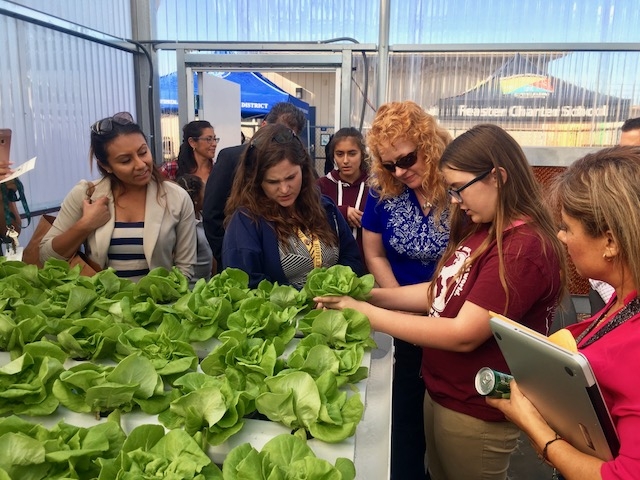
Growing produce to feed hungry folks while educating our students about innovative growing systems has been a great experience and our second year is going to be exciting.
With the greenhouse growers of the future learning valuable skills that can help them in every part of their lives, Mae L. Feaster Charter School in Chula Vista, CA is celebrating its Agra Tech hydroponics greenhouse’s first year anniversary. By partnering with Go Green Agriculture, one of the largest organic-hydroponic producers in North America, Feaster Charter has great support, and by getting advice and direction from Agra Tech, the school is poised and prepared for continued success.
Feaster Charter instructs students in grades 1-8 and is part of the Chula Elementary School District. Their greenhouse classes are offered as part of its 7th-8th-grade science and math curriculum as an elective. Associate Principal Angelica Sleiman has played a pivotal role in the greenhouse project since the very beginning, although it didn’t start out seamlessly. By working closely with the program’s instructor Marc Fraser, the greenhouse students are absorbing information just like their thirsty plants, she said.

Agra Tech Solar Light hydroponic greenhouse
“There’s been a huge learning curve for all of us, but a great experience for the students. It took us the first semester to learn the proper chemistry for the hydroponics, because the ratios have to be exact. If the plants are lacking in one nutrient, for example, some will turn yellow and others will grow faster than the rest. We’ve determined that operating and managing a greenhouse isn’t easy, but with help from Go Green and Agra Tech, we’re in good hands.”
Initially, the students at Feaster Charter grew only organic leafy greens, but now they’ve added tomatoes, bock choy, cilantro and cucumbers to their list of crops. Their ATI hydroponic greenhouse features a completely controlled environment, where computers control the temperature, humidity and light levels.
Go Green Chief Executive Officer Pierre Sleiman, Jr. sponsored the greenhouse by donating more than $8,000 in materials in support of the school board’s $81,000 investment into the program, including materials, permits and construction fees for the ATI greenhouse.
Pierre Sleiman is excited about what is currently happening at Feaster Charter’s greenhouse program as the students learn about more than just agriculture. “I’m so happy to see how the school and the students have really embraced this greenhouse and the curriculum they’ve developed. They are learning entrepreneurial skills, science, math, engineering and so much more in addition to agriculture. This industry is exploding right now and investors are scrambling to be involved, because things are changing at a rapid rate. So, to get these young people interested in this industry right now is a big deal. As other schools see what we’re doing, more and more of them all over the world will realize the value in these types of programs.”

Tomatoes growing in Solar Light Greenhouse for Feaster Charter School
Feaster Charter recently won an award for its greenhouse project from the Classroom of the Future Foundation, a non-profit organization that honors business, community and educational leaders to create innovative learning environments in San Diego County public schools.
The main goal of their greenhouse in 2018 is to market the produce that they grow, Angelica Sleiman said. “We’re fine tuning that part of the project and we’re not there yet, but we’re hoping to have the students breaking into teams and selling our produce next year. Once we can control the quality and uniformity of what we’re growing, we will sell the lettuce in the community. But, we want them to be perfect until we do.”
Currently, the school donates its crops to places like Father Joe’s Village in San Diego where they serve 3,000 meals and provide a continuum of care to nearly 1,800 individuals every day from infants and adolescents to adults and seniors.
By acquiring an Agra Tech greenhouse and integrating a series of cutting-edge subsystems within the structure, Feaster Charter is teaching its students world-class growing techniques. “As we built it out, Agra Tech was instrumental in consulting us during every phase,” she said. “Now, we are constantly asking them questions and they are great. We send them photos and they get back to us promptly every time. They’re working with us to have the greenhouse operating at 100% efficiency and with their help, we know we can do it.”
Now that the word is out in the educational community about Feaster Charter’s greenhouse, Angelica Sleiman is getting calls from other schools all over the country about building their own. “Having the greenhouse has provided us with a lot of exposure and we often give tours for people who are interested in what we’re doing here. Growing produce to feed hungry folks while educating our students about innovative growing systems has been a great experience and our second year is going to be exciting.”
Written by Ed Attanasio
TrustED Advertising
Published on:
01/22/2018
Post by:
Admin
Category:
Education
Greenhouses
Hydroponics
Vegetable Growing
Tag(s):
#Agra Tech
#ATI greenhouse
#Chula Elementary School District
#Chula Vista CA
#Feaster Charter School
#Future Foundation
#Go Green
#Greenhouse growers
#Hydroponics greenhouse
#Organic hydroponic producers
#Pierre Sleiman
#San Diego County
James Roberts at ATI was instrumental in assisting us in every aspect of this project. The support was outstanding, because James has a lot of knowledge and we tapped into it during every phase. He implemented our specs in the drawings we were provided and he was able to sort through everything. He became an important part of this project and we're extremely happy with the role he played.
Now that the Caribe Greenhouse Project has been a success, Cabiya and his team are looking to build even more greenhouses. "The Agra Tech greenhouses that we acquired are excellent and the company is great, so when the time comes, ATI will be a part of our next expansion."
Read article The Caribe Greenhouse Project
Caribe Greenhouse Project
Jose Cabiya
Juana Diaz, Puerto Rico